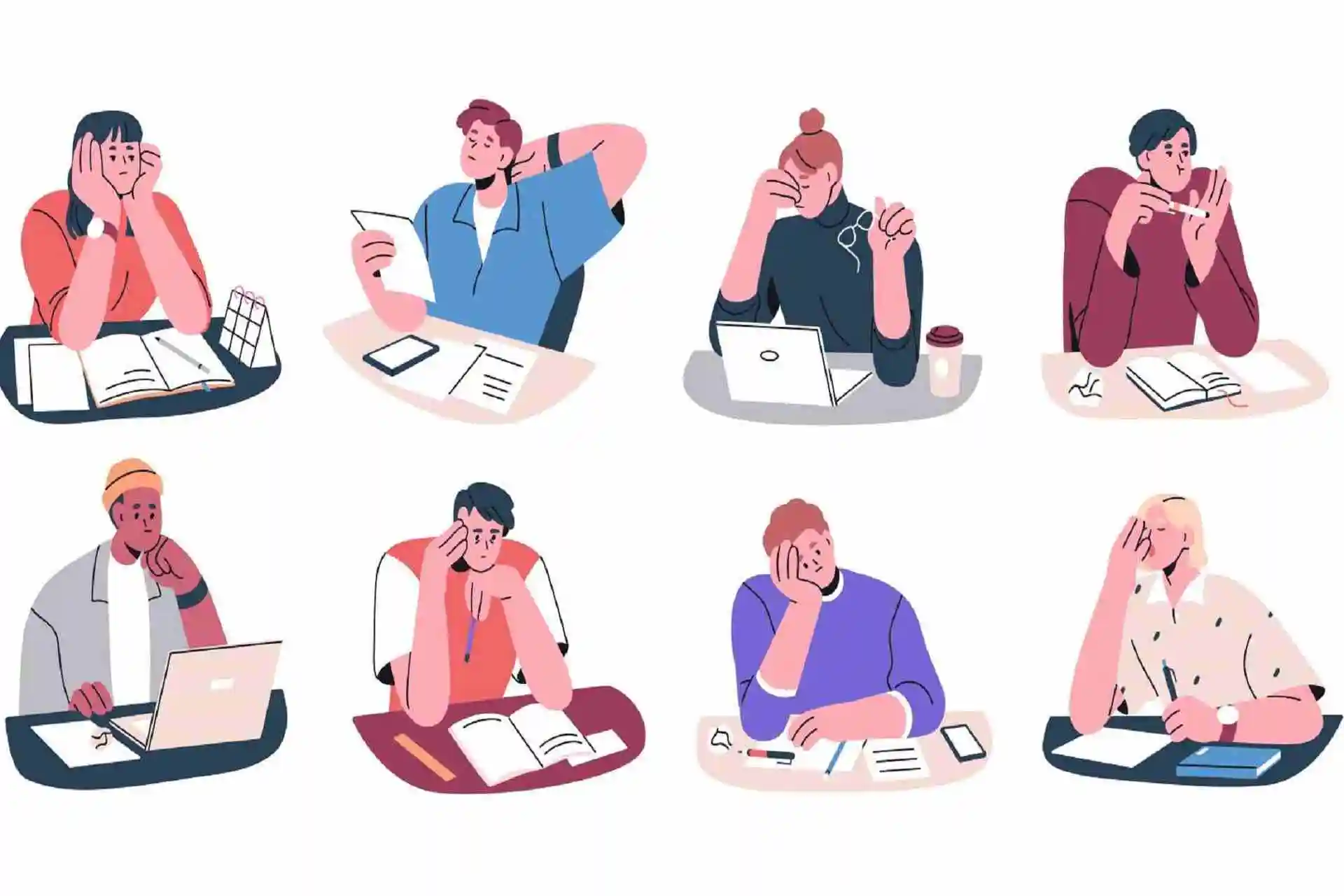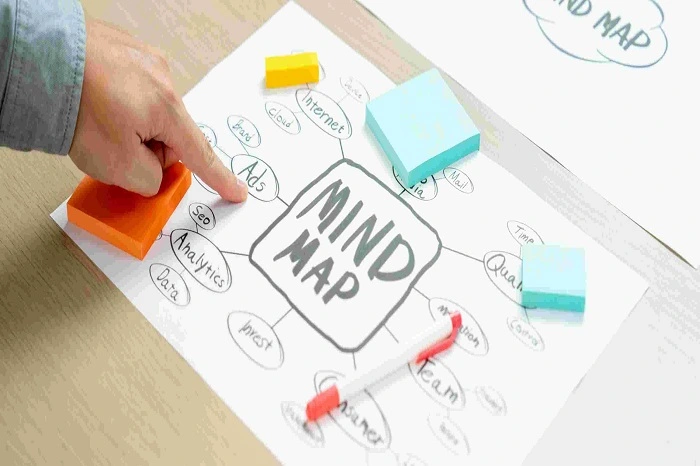1. The SQ3R Studying Technique
Importance of retrieving information
2. Recalling Practice
Try and recall the Information
3. Spaced Practice
Learning activities out over time
4. The PQ4R Method
Understanding of new material
5. Mind Mapping
Memory, Creativity and Understanding
For successful learning, it is necessary to develop good study tips for students.Learning abilities in time managementskills can set you up for continuous achievement in high school, college, and beyond, affecting your personal as well as professional life.
Setting goals, taking breaks, finding a quiet place to study, and taking practice exams are all examples of good study habits.
Speed and confidence can be increased by selecting your favourite way of learning and putting smart study methods into practice. Here are five strategies to reduce tension and perform at your best on exams and quizzes.
It can be difficult tostudy. The good news is that everyone can improve their study habits to increase the success, productivity, andpleasure of their studies. The start of the school year always seems to go by so fast. Don't worry, however; there are lots of ways to help you stay calm and not worryabout deadlines.
The entire list of Top 5 Study Tips for Students is given below:
1. The SQ3R Studying Technique
Importance of retrieving information

One of the best methods for helping students find important material and remember it from their textbook is the SQ3R approach. The short form for the five steps of the reading comprehension process is SQ3R, also sometimes written SQRRR.
To have a better and more effective study session, try this method:
- Survey:Start by reading the first chapter of the book rather than reading it cover to cover, making notes on any headings, subheadings, examples, or other relevant data like charts.
- Question:Create questions centered around the chapter's subject matter, such as: What is the topic of this chapter? What background knowledge do I have on this topic?
- Read:Start reading the chapter and search out the solutions to the questions you came up with.
- Recite:Write asummary of the part you just read in your own words. Try going over the second step again, noting the main ideas, andfollowing up on the questions.
- Review:After finishing the chapter, go over the content again to make sure you understand it all. Take a test on the questions you prepared and go back over any sections that you need to.
Finding data is identified as being important in the SQ3R study method. Survey, Question, Read, Recite, and Review is an initial for a study technique called SQ3R. Through being involved with their reading materials, children are better able to retain the material.
2. Recalling Practice
Try and recall the Information

Studying to recallinformation later on is called retrieval practice.5. Learning improves more when a question's solution remains than when it is found in a textbook. It is simpler to write down the answer on a flashcard and then remember it than to assume the answer and turn the card over too soon.
You increase your chances of remembering the information later on if you practice retrieval. Here are some tips for adding the retrieval process into your daily routine to help you study more effectively.
- Utilize practice tests:Quiz yourself with practice exams or questions rather than using your notes or book.
- Craft unique questions:Create test-like questions by taking the role of your teacher. Encourage others in your study group to share questions and follow examples.
- Use flashcards:Make flashcards, but work on your retrieval method. Avoid premature card flipping by writing down the answer and double-checking it.
- Two Things Activity: Ask the students tolist two items they learnt in your course, in the previous class, or today. Peer review in pairs or groups, as well as class discussion, can provide feedback.
- Brain Dumps:Request that students list all of their knowledge on a certain subject. You can use a specific prompt that is limited or broad-basedon what you want to learn. Students can then choose to contrast and compare their opinions with those of their peers in breakout rooms or small groups. Feedback from the lecturer can be received during the entire class discussion.
3. Spaced Practice
Learning activities out over time

Toimprove recall of knowledge, spaced practice is a study plan that divides the material into smaller portions and provides breaks. This study method is commonly used ineducational settingsand is known as one of the best for long-term memory recall.
Whether studying complex material or not, one of the finest methods is spaced or located practice. It motivates students to study for a longer amount of time as compared to jam-packing the night before. Our brains have to work harder to remember knowledge when they are on the point of forgetting it.
By spacing out your studies, you allow your mindto connect concepts and improve on information that you can quickly recall in the future. Try this study method by going over your content at regular intervals according tothe timetable below:
- Day 1:Gain knowledge of the subject in class.
- Day 2:Revisit and review.
- Day 3:Revisit and review.
- After one week:Revisit and review.
- After two weeks:Revisit and review.
Making plans in advance is important for learning how to study properly. Set aside time each day to review and study the subject at the start of each semester. You can hold yourself accountable for this, even if your tests are months away.
4. The PQ4R Method
Understanding of new material

PQ4R is an abbreviation that stands for the six steps in the process, much like the SQ3R technique. Its active method of learning makes it one of the best ways to study. You can increase the understanding and memorization of a subject by putting it into practice.
- Preview:Before you start reading, read the content to gain some understanding of the topic. Read only the headings, subheadings, and highlighted text as you quickly scan the content.
- Question:Ask the following questions about the subject: What am I hoping to learn? What previous knowledge do I have on this subject?
- Read:Try to find the answers to your questions as you go through every section of the text.
- Reflect:Have you answered all of my questions? If not, return and try to locate the solution.
- Recite:Give asummary of the material you just read in your own words, either in speech or writing.
Invention of PQ4R Method:
PQ4R was created by Thomas E.L. and Robinson H.A. (1972) to help students who suffer from reading. Many students suffer with comprehension, loyalty, and recall of material, and the PQ4R technique helps to make reading easier for students.
Advantages and disadvantages of PQ4R Method:
- Useful for reading difficult materials and writing.
- Improve understanding of the content by promoting discussion and reflection.
- Promotes logical and critical thinking abilities.
- Promotes continuous retention.
5. Mind Mapping
Memory, Creativity and Understanding

If you learn best through imagery, try mind mapping. It's one of the best study methods since it lets you arrange information in a diagram graphically. You start by writing a word in the middle of a white page. After that, you list the primary concepts and keywords and make a direct connection between them and the core idea. There will be more similar concepts that arise.
A mind map's structure is similar to how information is stored and processed in human brains. Reading comprehension can be increased by mind-mappingyour notes rather than just writing them down. It's among the greatest study methods for helping you see the broad picture by showing the relationships and hierarchy between concepts.
So, how do you do it?
- Take a blank piece of paper or use an online tool to write your research topic (e.g., "child development") in the center.
- Connect one of your primary concepts, such as a book chapter or set of notes, to the primary subject, such as "developmental stages."
- Connect supporting idea sub-branches to your primary branch. This is the concept association. For Example; "Sensorimotor," "Preoperational," "Concrete operational," and "Formal operational,"
- TIP: If it helps, show each branch with a different colour and/or drawing.
Benefits of mind mapping
- Using mind mapping improves quicker learning, better planning, and better interaction.
- The ability to perform all of the tasks mentioned above more quickly and effectively saves time.
- Improving the quality of your job, makes them important talents in the professional world.
How toApproachStudying
Don’t Cram
Even though learning a semester's worth of material in one sitting may seem like a smart idea, it is useless as a study habit and can lead to a great deal of unnecessary tension. Rather, dedicate at least 20 to 30 minutes a day to studying a little amount of knowledge. Later on, you'll likely recall more, and you'll feel more at ease and ready for the test.
Memorize vs. Understand
The difference between memory and an understanding of the subject matter is one of the study strategies for college that may greatly affect your approach to learning new material. Memory only teaches you how to repeat information over a limited period; it doesn't truly teach you the content.
For example, knowing the written forms of the verbs will help in your memory of the content if you are studying for a Spanish exam and must recall a conjugate verb chart.
Study Smarter, Not Harder
College professors can sometimes advise you on what will or won't be covered in an exam; pay attention to them! They are providing you with this knowledge tosave you time and allow you to focus on the most important things rather than spending hours studying irrelevant material. Send your lecturer a brief email toclarify if you're not sure what to focus on when studying, or get in touch with them after class.
Teamwork is Essential
Study with Friends
Studying with friends can increase both the pleasure and the efficiency of the process! Request that your peers join you for study sessions at a specific time and place. For instance, you could invite your biology classmates to spend an hour studying at the school cafeteria after class. To pass the time, you can arrange your PCs at a table and grab coffee and food.
Studying with friends is just like this. Studying in person with someone can help you hold each other honest if you're not in the same class as them. It's not your goal to be the one who cancels or shows up for a meeting with friends, is it?
Ask for Help
Ask questions if you're having problems understanding an idea. During office hours, stop by your professor’s offices, or send emails to both your teachers and classmates. Some courses may even have a Facebook group to promote interest and provide a place for questions outside of the classroom.
Teach Someone
A great way to test your knowledge of the content is to teach a friend, family member, or even your pet! You'll understand more clearly the material you already understand and which you need to review on your own when you explain it to someone else.
You can be creative, make an interesting Google Slides or PowerPoint presentation, and arrange the content so that both you and your audience easily understand it. Who knows, maybe you'll use that presentation for your classmates later on!
Frequently Asked Questions:
Q1: How long should my study sessions be?
Yourtastes and attention span will decide how long you study. Start with sessions that last between 30 and 60 minutes, and if you can focus for longer periods, then gradually increase the time.
Q2: Is it better to study every day or have dedicated study days?
When it comes to studying, consistency is key. Generally speaking, studying in small doses during the day is more productive than trying to fit everything into a few focused study days. Finding a balance that suits you, though, is essential.
Q3: Should I study one subject at a time or mix them up?
Changing up the topics you study can help you stay interested and avoid boredom. Certain fields of study, however, could need greater concentration and focus. In certain situations, it might be more beneficial to give specific periods to those topics.






